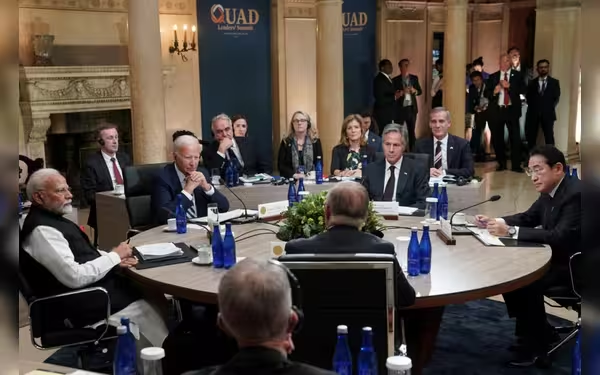Saturday, September 28, 2024 10:23 PM
Biden Hosts Final QUAD Summit Before Leaving Office
- Biden's last QUAD summit focuses on maritime security.
- India remains cautious about military alliances.
- Future of QUAD hinges on US political landscape.
 Image Credits: thefrontierpost
Image Credits: thefrontierpostBiden's final QUAD summit emphasizes maritime security amid rising tensions with China.
The recent meeting of the QUAD leaders, which includes Australia, India, Japan, and the United States, was hosted by American President Joe Biden. This summit marks Biden's final gathering with these leaders before he steps down from office in January 2025. During this significant meeting, the leaders announced a joint coastal guard exercise aimed at enhancing maritime security among the member countries. However, specific details about the exercise were not disclosed, except that representatives from the four nations will participate aboard a US Coast Guard vessel.
Australian Prime Minister Anthony Albanese emphasized that the collaboration among the coast guard personnel from these countries would improve the 'inter-operability' of their security systems. Although the group did not explicitly name China, the meeting commenced with an American report focusing on China's activities. President Biden remarked that China is altering its tactics while maintaining its strategy, continuing to challenge the United States in the South and East China Seas, as well as in the Taiwan Strait.
Biden expressed his belief that Chinese President Xi Jinping is currently prioritizing domestic economic issues and attempting to stabilize China's diplomatic relationships. He suggested that Xi is also seeking to create some diplomatic space to pursue China's interests more aggressively. Biden views the QUAD as a significant part of his legacy and is confident in its future.
Among the four leaders, only Indian Prime Minister Narendra Modi is expected to remain in office for the next five years, having secured re-election through a coalition in the summer parliamentary elections. In contrast, Biden will leave office following the presidential election on November 5, as he has opted not to run for re-election. Japanese Prime Minister Fumio Kishida will also step down, as he will not contest the leadership of the ruling Liberal Democratic Party. Meanwhile, Albanese is preparing for a parliamentary election next year.
American experts have observed that India does not perceive the QUAD as a military alliance, while the United States believes India should engage more in the security aspects of the QUAD. Since gaining independence in 1947, India has not joined any military alliances. Security expert Lisa Curtis noted, "But I think China’s recent maritime aggression could be changing the equation for India and could be prompting India to become a bit more open to the idea of QUAD security cooperation." However, given India's established foreign policy, it is unlikely that New Delhi will accept the QUAD as a military group.
The United States' commitment to Taiwan, along with the close military ties between Australia, Japan, and the United States, suggests that security linkages among these three nations will strengthen. India, while remaining an outsider, has argued that the South China Sea should be a free region for international shipping. In contrast, China asserts that the South China Sea falls within its sphere of influence and claims maritime sovereignty over the area. This disagreement is a significant point of contention.
Looking ahead, a pressing question arises: Will the US continue its involvement in the QUAD if Republican candidate Donald Trump wins the presidential election? Trump has historically opposed external entanglements and has shown little interest in challenging China's dominance in the South China Sea. Nevertheless, the QUAD is likely to remain relevant, as all member countries share concerns about China's growing influence in Southeast Asia and its claims over vital sea lanes in the South China Sea.
Moreover, economic factors play a crucial role. Both Australia and Japan heavily rely on China's markets for their exports. The Indo-Pacific region continues to be a focal point of strategic interest for the United States, with China positioned as a rival on multiple fronts, both visible and hidden. The ongoing dynamics in this region will undoubtedly shape the future of international relations and security cooperation among these nations.
The QUAD summit reflects the complexities of international relations in the face of rising tensions with China. As member countries navigate their individual interests and collective security concerns, the future of the QUAD will be pivotal in determining the balance of power in the Indo-Pacific region. The ongoing dialogue and cooperation among these nations will be essential in addressing the challenges posed by an assertive China, ensuring that the waters of the South China Sea remain open and free for all.













